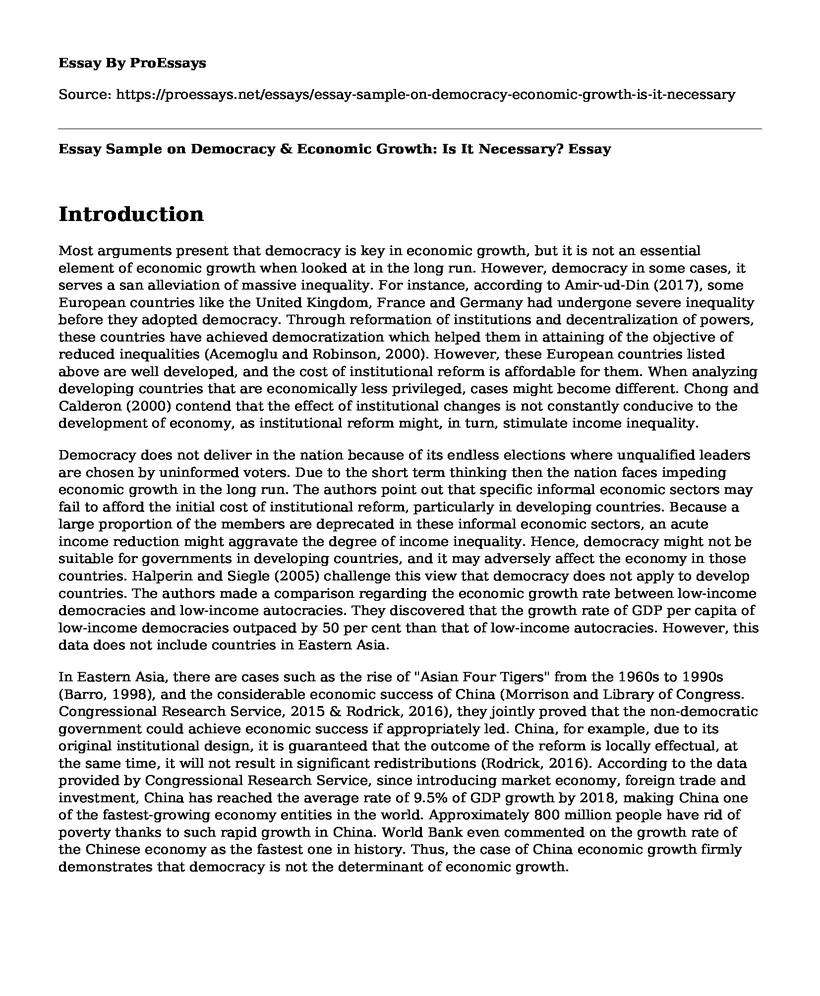Introduction
Most arguments present that democracy is key in economic growth, but it is not an essential element of economic growth when looked at in the long run. However, democracy in some cases, it serves a san alleviation of massive inequality. For instance, according to Amir-ud-Din (2017), some European countries like the United Kingdom, France and Germany had undergone severe inequality before they adopted democracy. Through reformation of institutions and decentralization of powers, these countries have achieved democratization which helped them in attaining of the objective of reduced inequalities (Acemoglu and Robinson, 2000). However, these European countries listed above are well developed, and the cost of institutional reform is affordable for them. When analyzing developing countries that are economically less privileged, cases might become different. Chong and Calderon (2000) contend that the effect of institutional changes is not constantly conducive to the development of economy, as institutional reform might, in turn, stimulate income inequality.
Democracy does not deliver in the nation because of its endless elections where unqualified leaders are chosen by uninformed voters. Due to the short term thinking then the nation faces impeding economic growth in the long run. The authors point out that specific informal economic sectors may fail to afford the initial cost of institutional reform, particularly in developing countries. Because a large proportion of the members are deprecated in these informal economic sectors, an acute income reduction might aggravate the degree of income inequality. Hence, democracy might not be suitable for governments in developing countries, and it may adversely affect the economy in those countries. Halperin and Siegle (2005) challenge this view that democracy does not apply to develop countries. The authors made a comparison regarding the economic growth rate between low-income democracies and low-income autocracies. They discovered that the growth rate of GDP per capita of low-income democracies outpaced by 50 per cent than that of low-income autocracies. However, this data does not include countries in Eastern Asia.
In Eastern Asia, there are cases such as the rise of "Asian Four Tigers" from the 1960s to 1990s (Barro, 1998), and the considerable economic success of China (Morrison and Library of Congress. Congressional Research Service, 2015 & Rodrick, 2016), they jointly proved that the non-democratic government could achieve economic success if appropriately led. China, for example, due to its original institutional design, it is guaranteed that the outcome of the reform is locally effectual, at the same time, it will not result in significant redistributions (Rodrick, 2016). According to the data provided by Congressional Research Service, since introducing market economy, foreign trade and investment, China has reached the average rate of 9.5% of GDP growth by 2018, making China one of the fastest-growing economy entities in the world. Approximately 800 million people have rid of poverty thanks to such rapid growth in China. World Bank even commented on the growth rate of the Chinese economy as the fastest one in history. Thus, the case of China economic growth firmly demonstrates that democracy is not the determinant of economic growth.
Reference
Acemoglu, D. and Robinson, J.A. (2000). Why Did the West Extend the Franchise? Democracy, Inequality, and Growth in Historical Perspective. The Quarterly Journal of Economics, 115(4): pp.1167-1199.
Amir-ud-Din, R. (2017) Democracy, Income Inequality and Economic
Growth Nexus: The Case of Pakistan. Pakistan Journal of Commerce and Social Sciences 11 (1): pp. 205-220.
Barro, J.R. (1998) THE EAST ASIAN TIGERS HAVE PLENTY TO ROAR ABOUT. Business Week April 27:pp. 24.
Chong, A. and Calderon, C. (2000) Institutional Quality and Income Distribution.Economic Development and Cultural Change, 48(4): pp. 761-786.
Halperin, M.H. and Siegle, J.T. (2005) The Democracy Advantage: How Democracies Promote Prosperity and Peace. Foreign Affairs 84(2): pp.149.
Morrison, W.M. and Library Of Congress. Congressional Research Service (2015) China's Economic Rise: History, Trends, Challenges, and Implications for the United States. Washington, D.C.: Library Of Congress, Congressional Research Service.
Rodrik, D. (2016). Is Liberal Democracy Feasible in Developing Countries? Studies in Comparative International Development 51(1): pp.50-59.
Cite this page
Essay Sample on Democracy & Economic Growth: Is It Necessary?. (2023, Apr 24). Retrieved from https://proessays.net/essays/essay-sample-on-democracy-economic-growth-is-it-necessary
If you are the original author of this essay and no longer wish to have it published on the ProEssays website, please click below to request its removal:
- Essay Example on the American Party System
- Santa Fe Case: Gov't Protects Person, Property, & Religious Liberty
- Italian Constitution Establishes a Parliamentary Republic: Essay Sample
- Research Paper on Kentucky in the National Imagination: Hillbilly Stereotypes and White Residents
- Paper Example on Struggle for Power & Supremacy: Who's Ahead?
- Essay Example on Women On Top: Managerial Strategies in Entrepreneur Sectors
- Community Regulating: A New Way to Improve Safety & Quality of Life - Report Example







